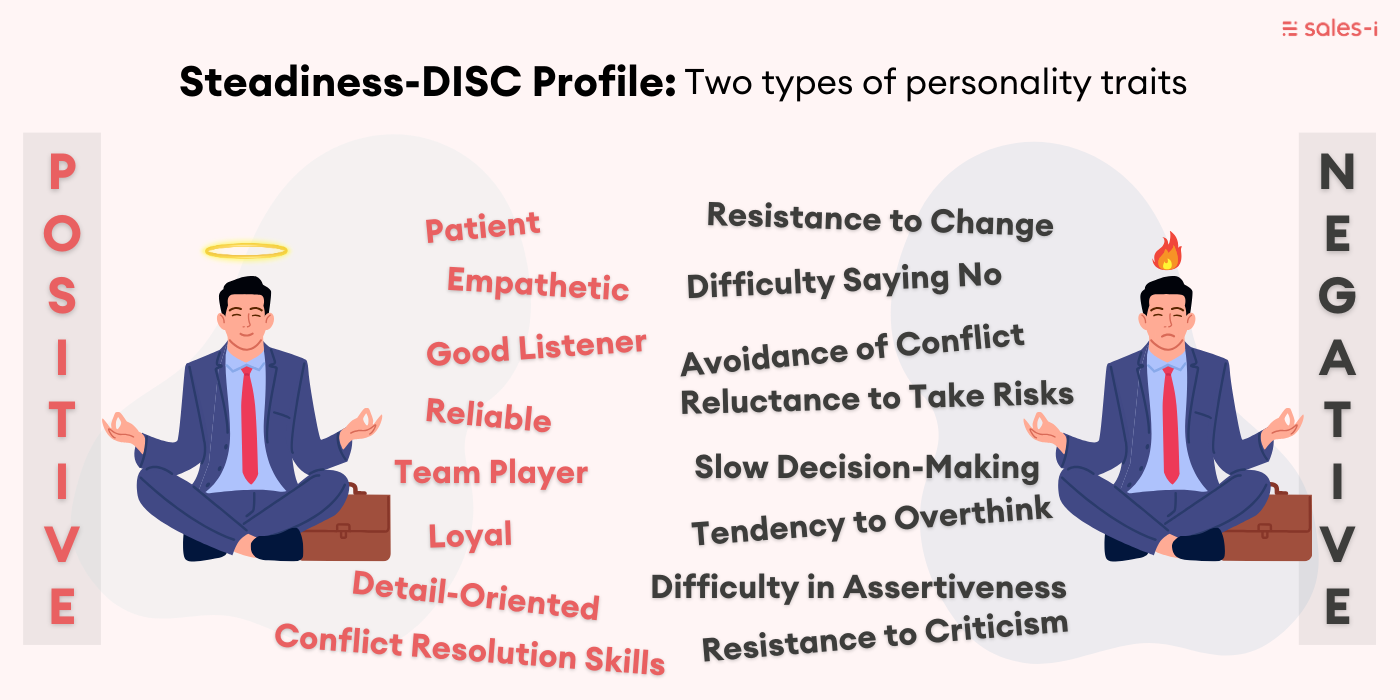In the dynamic world of B2B sales, understanding your clients and effectively navigating their needs is paramount. One of the primary DISC personality profiles is Steadiness (S). In this blog post, we'll delve into the Steadiness DISC profile and explore how leveraging this knowledge can drive success in B2B sales.
- Understanding the Steadiness (S) Profile
- What are the personality traits of an S DISC Profile
- How to spot a S DISC Profile
- Where to find S DISC Profiles within a business
- Understanding how to deal with an S DISC Profile in B2B Sales
Understanding the Steadiness (S) DISC Profile
The Steadiness DISC profile represents individuals who are known for their calm and patient demeanor. They value stability, harmony, and strong interpersonal relationships. Understanding the Steadiness profile can be a game-changer in the B2B sales arena.
What are the personality traits of an (S) DISC profile?
Individuals with a Steadiness DISC profile, often labeled as "S" in DISC assessments, exhibit a set of personality traits that can have both positive and negative aspects. These traits are associated with a preference for stability, harmony, and strong interpersonal relationships. Keep in mind that people are unique, and these traits can manifest differently in different individuals.
Here are some positive and negative personality traits associated with the Steadiness profile:

Positive Traits:
- Patient: Steadiness profiles are known for their patience and ability to remain calm, even in challenging situations.
- Empathetic: They are often highly empathetic and can easily understand and relate to the emotions and concerns of others.
- Good Listener: Steady individuals excel at active listening, making others feel heard and valued in conversations.
- Reliable: They are dependable and consistent, which makes them trustworthy in both personal and professional relationships.
- Team Player: Steadiness profiles work well in teams, fostering collaboration and cooperation among colleagues.
- Conflict Resolution Skills: They are skilled at mediating conflicts and finding harmonious solutions to interpersonal issues.
- Loyal: Steady individuals are often loyal to their relationships, whether in personal friendships or professional partnerships.
- Detail-Oriented: They have an eye for detail, which can be beneficial in tasks that require precision and accuracy.
Negative Traits:
- Resistance to Change: Steadiness profiles may resist or feel uncomfortable with significant changes or disruptions to their routines.
- Difficulty Saying No: They may have a hard time saying no to requests, which can lead to overcommitment and stress.
- Avoidance of Conflict: While they are skilled at conflict resolution, they may avoid confrontation to maintain harmony, even when addressing important issues is necessary.
- Reluctance to Take Risks: Steadiness profiles tend to be risk-averse and may hesitate to take calculated risks or embrace new opportunities.
- Slow Decision-Making: Their preference for careful consideration can lead to slower decision-making processes, which may not be suitable for fast-paced environments.
- Tendency to Overthink: They may overthink situations, considering multiple perspectives and possibilities, which can lead to indecision.
- Difficulty in Assertiveness: Steadiness profiles may struggle with assertiveness, particularly when it involves advocating for their own needs or boundaries.
- Resistance to Criticism: They may take criticism personally and be sensitive to feedback, potentially hindering personal or professional growth.
It's important to recognize that these traits represent a spectrum, and individuals with Steadiness profiles may exhibit these characteristics to varying degrees. In both personal and professional settings, individuals with Steadiness traits can contribute positively to team dynamics, promote harmony, and excel in roles that require patience, empathy, and attention to detail. Balancing these traits with adaptability and assertiveness can help individuals with a Steadiness profile navigate various situations effectively.
How can salespeople spot a prospect with an (S) DISC profile?
Here are some common signs to help you identify someone with an S DISC profile:
- Slower-paced.
- People orientated.
- Quietly spoken.
- Calm.
- Likes consensus.
Where to find (S) DISC profiles within a business?
Individuals with a Steadiness DISC profile, often labeled as "S" in DISC assessments, tend to excel in business functions and roles that require a calm and patient demeanor, strong interpersonal skills, and a focus on stability and harmony. Here are some business functions that typically see Steadiness DISC profiles:
- Customer Service: Steadiness profiles are well-suited for customer service roles, where their patience, empathy, and ability to handle customer inquiries and concerns in a reassuring manner are highly valuable.
- Support and Helpdesk: In roles that involve providing technical or product support, Steadiness personalities are effective at patiently assisting customers and resolving issues.
- Human Resources: HR professionals often have Steadiness traits as they mediate conflicts, handle employee relations, and create a harmonious workplace environment.
- Team Leadership: Managers with a Steadiness profile tend to prioritize team cohesion, open communication, and employee well-being, fostering a positive work culture.
- Training and Development: Trainers who exhibit Steadiness traits can create a comfortable and safe learning environment for participants, ensuring effective skill development.
- Quality Assurance: Professionals involved in quality control and assurance roles can benefit from Steadiness traits as they focus on maintaining consistency and accuracy.
- Administration and Office Management: Those in administrative roles require organizational skills, attention to detail, and the ability to maintain a smooth-running office environment, all of which align with Steadiness traits.
- Environmental and Sustainability Roles: Those dedicated to environmental conservation and sustainability often value stability, perseverance, and a commitment to long-term goals.
Steadiness profiles are known for their ability to create a harmonious and supportive work environment, resolve conflicts, and maintain a sense of stability, making them valuable assets in various business functions that emphasize teamwork, customer satisfaction, and employee well-being.
How salespeople can leverage the (S) DISC Profile in B2B Sales?
Here's how to harness the power of the Steadiness DISC profile to drive success in your B2B sales efforts:
- Building Trust through Patience
Steady personalities value patience and a steady approach. In B2B sales, take the time to build trust with your clients. Demonstrate that you are willing to invest the time required to understand their needs thoroughly. Be patient in answering their questions and addressing their concerns, showing your commitment to their well-being.
- Effective Listening Skills
Steadiness profiles are exceptional listeners. They appreciate it when you take the time to listen attentively to their requirements and concerns. Encourage open dialogue, ask open-ended questions, and provide a platform for them to express their thoughts and ideas. This will help you understand their needs on a deeper level.
- Fostering a Sense of Harmony
Steadiness profiles thrive in harmonious environments. When engaging with Steady clients, focus on creating a sense of collaboration and partnership. Emphasize that your goal is to work together to find solutions that benefit both parties. Avoid confrontational or high-pressure tactics.
- Stability and Consistency
Highlight the stability and reliability of your product or service. Steadiness personalities appreciate consistency and predictability. Showcase your track record of delivering reliable solutions and maintaining long-term client relationships.
- Addressing Concerns with Empathy
Steady individuals are often sensitive to the feelings of others. When dealing with a Steady client's concerns, approach the situation with empathy and understanding. Acknowledge their worries and demonstrate that you genuinely care about resolving them.
- Avoiding Rushed Decisions
Steadiness profiles may require more time to make decisions. Avoid pressuring them into quick choices. Instead, provide them with all the information they need to make an informed decision at their own pace. - Long-Term Relationship Focus
Emphasize your commitment to long-term relationships. Steady clients are often loyal and value enduring partnerships. Show that you are interested in maintaining a mutually beneficial relationship beyond the initial sale.
Understanding and effectively engaging with clients who exhibit the Steadiness DISC profile is a strategic advantage in B2B sales. By building trust through patience, honing your listening skills, fostering a sense of harmony, and emphasizing stability and empathy, you can connect with Steady clients on a deeper level, inspire trust, and drive success in your sales efforts. Remember that every client is unique, so while these strategies are tailored to Steadiness personalities, adaptability and responsiveness to individual needs remain essential for achieving the best results in B2B sales.

%EF%B9%96width=1080&name=Want%20to%20find%20out%20more%20about%20how%20sales-i%20can%20mix%20your%20hard%20and%20soft%20data%20together%20(2).png)